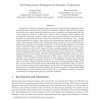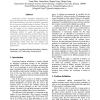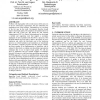148 search results - page 16 / 30 » Improving simulation-based verification by means of formal m... |
ASE
2005
13 years 7 months ago
2005
Techniques for efficiently evaluating future time Linear Temporal Logic (abbreviated LTL) formulae on finite execution traces are presented. While the standard models of LTL are i...
CSCWD
2009
Springer
14 years 2 months ago
2009
Springer
Constrained random simulation methodology still plays an important role in hardware verification due to the limited scalability of formal verification, especially for the large an...
ICAIL
2003
ACM
14 years 23 days ago
2003
ACM
Problems with legal quality will not only increase effort and costs of the law enforcement organisations, but also undermines the regulating power of the legislator. Unintended us...
POPL
2007
ACM
14 years 7 months ago
2007
ACM
An invariance assertion for a program location is a statement that always holds at during execution of the program. Program invariance analyses infer invariance assertions that ca...
ICASSP
2011
IEEE
12 years 11 months ago
2011
IEEE
In this paper we first introduce four kinds of modification of Symmetric Scoring [1] which produce likelihood ratios that do not need to be explicitly normalized, i.e. T-norm, Z...



